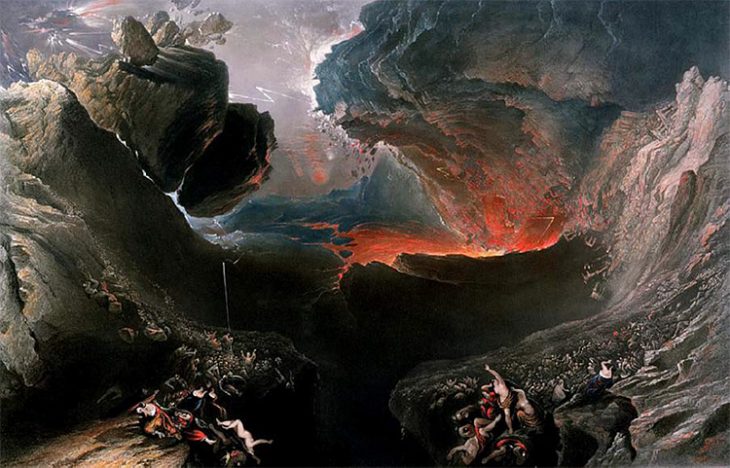The Meaning of Wrath
Does this make God a “monster”? No! On the contrary, God’s wrath proves His goodness, for how could a good God ignore the evil of sin and allow it to go unpunished? His wrath against evil will demonstrate His righteousness.
The prophet Nahum summed it up best. Writing of the love of God, he said, “The Lord is good, a stronghold in the day of trouble, and He knows those who take refuge in Him” (Nahum 1:7). But a few verses earlier Nahum had also spoken of the holiness and wrath of God:
2) A jealous and avenging God is the LORD; The LORD is avenging and wrathful. The LORD takes vengeance on His adversaries, And He reserves wrath for His enemies.
3) The LORD is slow to anger and great in power, And the LORD will by no means leave the guilty unpunished…
(Nahum 1:2-3)
God’s wrath is never motivated primarily by a desire to punish. Rather, it is designed to bring people to repentance so that they might be saved. Even in His wrath, God remembers mercy.
God demonstrates His mercy in wrath by never pouring out His wrath without warning. He tried to warn Sodom and Gomorrah through Abraham. He warned Noah’s world through the preaching of Noah for 120 years. He sent both Jonah and Nahum to warn the pagan city of Nineveh.
Consider too how He sent prophet after prophet to call the nations of Israel and Judah to repentance (2 Chronicles 36:15-16):
15) The LORD, the God of their fathers, sent word to them again and again by His messengers, because He had compassion on His people and on His dwelling place;
16) but they continually mocked the messengers of God, despised His words and scoffed at His prophets, until the wrath of the LORD arose against His people, until there was no remedy.
God’s mercy in wrath is also manifested in the fact that He always leads up to His final outpouring of wrath through a series of progressive judgments. These judgments are outlined in detail in Deuteronomy 28:15-57.
This characteristic of God’s wrath is demonstrated in the prophecies concerning the Tribulation. Rather than simply pouring out His wrath on the rebellious nations of the world, destroying them in one instant of overwhelming catastrophe, He subjects the world to a series of judgments that sequentially increase in scope and intensity (Revelation 6,8-9,16).
Although most people refuse to repent in response to these judgments (Revelation 9:20-21), there is “a great multitude, which no one could count, from every nation and all tribes and peoples and tongues” who do repent and respond to Jesus in faith (Revelation 7:9).
These radically different responses to the wrath of God illustrate the point that is often made by Billy Graham: “The same sun that melts the butter also hardens the clay.” The wrath of God melts some hearts in repentance, but it has the effect of hardening the hearts of many others.
Wrath and the Redeemed
Many Christians respond negatively to Bible prophecy. It’s not at all unusual to hear a Christian say something like this: “I don’t want to hear anything about prophecy because it’s too full of gloom and doom.”
Well, there is a lot of gloom and doom for those who refuse to respond to God’s gift of love in Jesus. But there is only good news for the Redeemed.
The Old Testament ends with a passage that presents both the gloom and the joy of end time prophecy. Malachi says that when the Lord returns, the day will be “like a furnace; and all the arrogant and every evildoer will be chaff” (Malachi 4:1). That’s the bad news.
But consider the good news: “But for you who fear My name, the sun of righteousness will rise with healing in its wings; and you will go forth and skip about like calves from the stall” (Malachi 4:2).
There is no reason for any child of God to fear the wrath of God. Paul wrote that since we have been justified by the blood of Christ, “we shall be saved from the wrath of God through Him” (Romans 5:9). And in a most comforting verse, Paul told the Thessalonians that Jesus will “deliver” the Redeemed “from the wrath to come” (1 Thessalonians 1:10). The reason, Paul explained, is that “God has not destined us for wrath, but for obtaining salvation through our Lord Jesus Christ” (1 Thessalonians 5:9).
A Plea
Are you under grace or wrath? The choice is yours. Jesus is coming soon. When He appears, will He be your Blessed Hope or your Holy Terror? Will you cry for the mountains to fall upon you? Or, will you go forth leaping with joy like a calf released from a stall?
God loves you and He wants you to accept His Son as your Savior so that you will come under grace and can participate in an event that will occur when Jesus returns (Isaiah:35:10):
And the ransomed of the Lord will return,
And come with joyful shouting to Zion,
With everlasting joy upon their heads.
They will find gladness and joy,
And sorrow and sighing will flee away.







